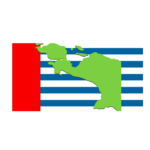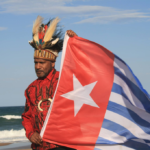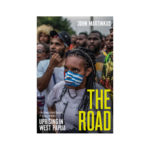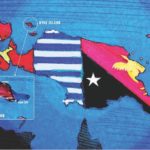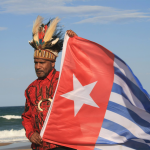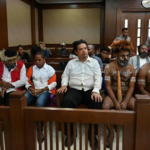Disrupting Weapons Suppliers: An Interview With Make West Papua Safe’s Jason MacLeod
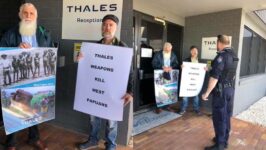
Professor Jason MacLeod and several other antiwar activists staged a peaceful demonstration on the doorstep of the Brisbane offices of transnational weapons manufacturer Thales on 31 May, to draw attention to the company supplying weapons that are used to kill West Papuan people.
As police turned up to deal with the activists, MacLeod told officers that he was there to report a crime involving Thales supplying the Indonesian government with weapons used upon West Papuan civilians, and he would like them to investigate the matter.
However, for their troubles in pointing out that the West Papuans are suffering under the Indonesian colonial regime, he and fellow demonstrator Professor David Johnson were arrested for trespassing and taken to the Brisbane Watchhouse.
Those demonstrating at Thales were members of the Make West Papua Safe group, who were also involved in the wider Disrupt Land Forces actions that took place at the Land Forces 2021 arms fair at the Brisbane Convention Centre last week.
Resistance rising
The Indonesian government has recently deployed more troops into West Papua. This follows president Joko Widodo having labelled Indigenous freedom fighters as terrorists in their own homelands in late April, after Jakarta’s head of intelligence in the occupied region was killed.
President of the recently formed West Papuan provisional government Benny Wenda set out in a statement last week that Indonesian authorities have cut the internet in West Papua, so the word on its operations in the region doesn’t get out.
On the terrorist classification, Wenda said this “is nothing but more discrimination against the entire people of West Papua and our struggle to uphold our basic right to self-determination”. And he added that Jakarta has deployed more than 21,000 troops over the last three years.
Indonesia commenced its occupation of the Melanesian nation in 1963. Recent years have seen local resistance forces join to form the West Papua Army, a provisional government has been established, and a clandestine cabinet and government departments have been setup on Papuan soil.
Making it safe
Professor MacLeod founded Make West Papua Safe, which aims to stop Australian government support of what’s happening in the occupied region of West Papua, via its relationships with the Indonesian military and police.
“This is not just about human rights. It is about preserving life and human dignity,” the MWPS website makes clear. “The least Australia can do is stop supporting the worst of Indonesia’s human rights abusers.”
Sydney Criminal Lawyers spoke to MWPS’ Professor MacLeod about why, out of all the weapons companies at the Brisbane arms fair, the was a focus on Thales, how targeting the commercial suppliers of arms marks a change in tactic, and how solidarity between resistance movements is key.
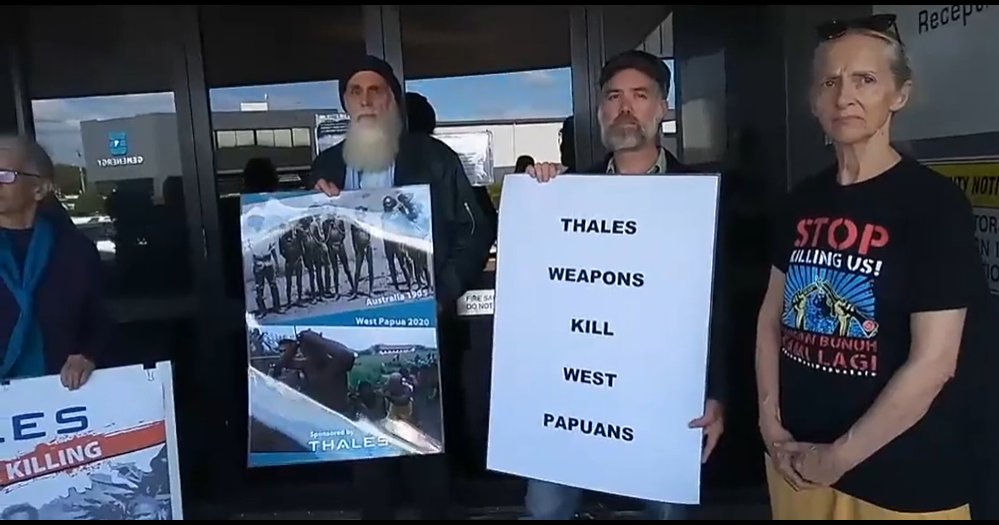
Firstly, on 31 May, as part of the wider Disrupt Land Forces demonstrations that took place in Brisbane, you and several others staged a peaceful protest out the front of the local office of transnational weapons company Thales.
This was on the day prior to the opening of the Land Forces 2021 expo, where there were hundreds of weapons companies displaying their wares. Jason, why did you target Thales for this initial action?
We’ve had our eye on Thales for quite some time. It’s originally a French arms company, but it’s now transnational.
They’ve been increasing their manufacturing base in Australia. They make the Bushmaster, which is a cross between an off-road vehicle and a tank.
They’re one of the companies that are selling to Indonesia. They have been selling Bushmasters to Kopassus. We also believe the munitions that they make are being sold to Indonesia.
You’ve said that you’ve seen some evidence of that?
Yes. We have seen some. There have been a whole lot of rocket-fired grenades that have been used upon villages in the highlands of West Papua: Nduga, Intan Jaya and Puncak.
People have been turning up with shells. And we’ve found some unexploded ordinance as well. We very strongly suspect they are from Thales, and we’ve been digging into that.
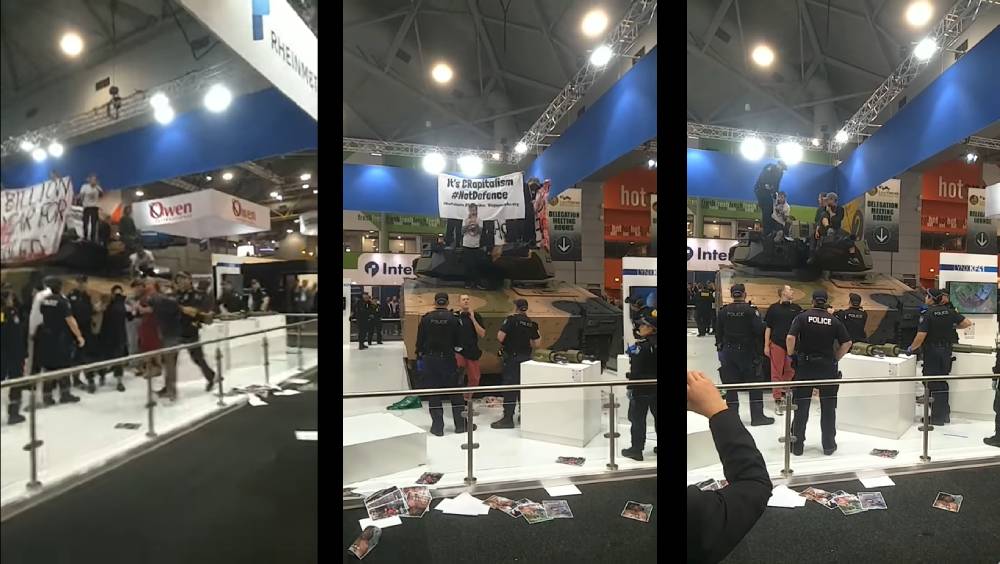
There were ongoing actions out the front of the Brisbane Convention Centre as the three day arms fair took place. Your group, Make West Papua Safe, played a key role in the storming of the event and staging a demonstration on top of a tank that was on display.
Can you talk about the significance of that action?
As you said, there were hundreds of arms companies there, and we really wanted to disrupt it. We wanted to raise the economic and the political cost of manufacturing and exporting weapons to conflicts all around the world.
We wanted to disrupt the whole narrative that this makes us secure. Those weapons are not secure, and they do not make us secure.
It’s going to be peace and justice in the region and good relationships that make us secure.
In the case of West Papua, these arms companies are supplying weapons to the Indonesian police and military to repress ordinary West Papuans who simply want their country back and are calling for self-determination.
The weapons being supplied are also being used to facilitate resource extraction, whether that’s gold and copper from the Anglo Australian Freeport mine, or whether it’s oil and gas in the Bird’s Head Peninsula, or whether it’s to expand the frontier of coal into West Papua.
Last week’s actions were targeting the weapons companies involved in supplying often larger occupying forces with arms to carry out actions against those they’re oppressing, as is the case in West Papua.
Why target these commercial interests? Why not call upon our government to do something about the genocide that’s taking place on our nation’s doorstep?
We are continuing to focus on the government. But I would say that we’ve had 50 years of quite generalised action and advocacy that was targeting the government and calling on them to support self-determination in West Papua.
This hasn’t really shifted things. Indeed, you’ve seen both major political parties – the Liberal Nationals and Labor – entrench their position.
So, what we’re trying to do is to continue that work with the government but make it much more strategic.
The other part of Making West Papua Safe is targeting the Australian Federal Police’s training of the Indonesian National Police, who are carrying out military operations with the Indonesia military.
The Indonesian National Police are embedded in the Indonesian military and are involved in things like extrajudicial killings.
Also, we are starting to experiment with some of the commercial interests. We think these interests are possibly more vulnerable.
Some of these companies have shareholders. Boeing supplies attack helicopters to the Indonesian police and military. It’s a company with a commercial arm. So, they’re more vulnerable to wider citizen participation targeting their operations.
Disrupt was really to test our supporters’ appetite for engaging in this kind of nonviolent and disruptive action. It was to probe and see what kind of commercial targets might be conducive to developing a strategically focused campaign.
The action against Thales was part of that. The action inside the arms exhibition was also part of that. And that will continue to happen.
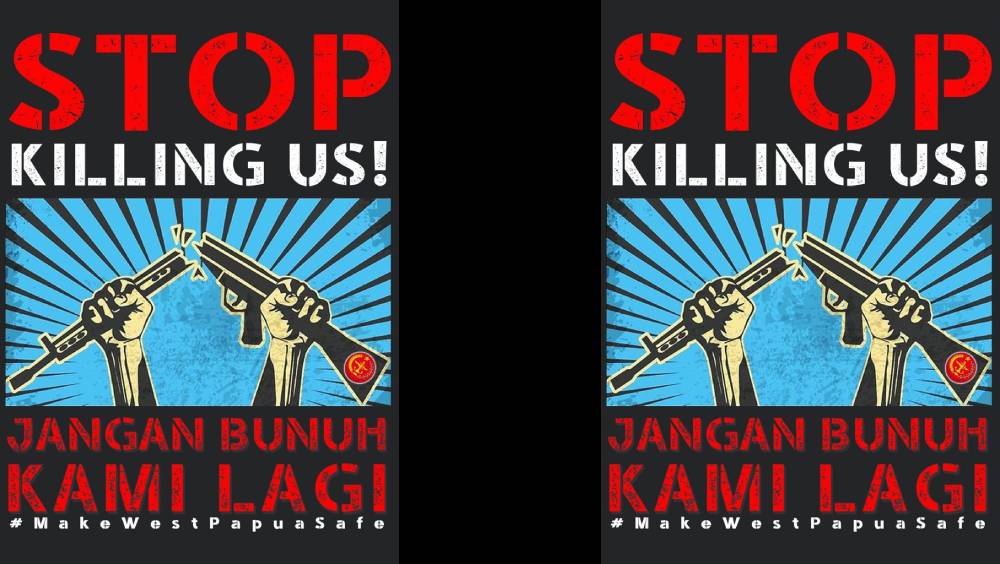
Your main focus is on West Papua. Right now, Jakarta is cracking down on the region that it’s occupied since 1963. How would you describe what’s going on over there at this time?
From what I’m hearing from my colleagues in West Papua on a daily basis, the situation on the ground is worsening.
The war is spreading from Nduga from where it’s been going on since December 2018. It’s spreading into neighbouring districts, particularly Ilaga and Puncak.
We’re hearing reports from humanitarian workers that there are thousands – possibly more than 10,000 – internally displaced people that have fled into neighbouring districts and also into cities and towns on the coast.
We’ve been hearing reports of people dying from starvation and exposure as they seek shelter in the forest.
Jakarta has branded the OPM – the Organisasi Papua Merdeka or the Free Papua Movement – as terrorists. They’re pushing that line very strongly.
They’re accusing journalists, church leaders and even members of the elected government of being separatists. They’re really widening their targets.
On the one hand, it’s causing an incredible amount of stress for West Papuans. But it’s also making people a lot more determined. It’s causing the opposite effect to what Jakarta wanted, as more people are saying they have no choice but to have a referendum on independence.
Jakarta has tried to push its special autonomy policy, which has been widely rejected. A new tactical front of up to 105 organisations inside the country have formed to reject special autonomy and start mass civilian-based mobilisations against it.
The violence is increasing, but so too, is the civilian-based opposition, along with the determination with the guerrilla war in the highlands.
We last spoke in October 2019. Since then, the West Papuans have consolidated their military forces in their homelands, they’ve formed a provisional government, and set up a clandestine cabinet with government departments in West Papua itself.
What are your thoughts on these developments?
I’ve been part of the movement for over 30 years now. And this shows that it’s getting progressively more organised and determined.
The other thing that has happened is the Papuan People’s Petition or the Petisi Rakyat Papua. So, there’s this unity building work happening at different levels inside and outside the country.
It also shows that Jakarta’s security approach is not working and never has worked. The security approach is not to resolve the conflict. It is to continue to extract Papuan resources and take control of Papuan land.
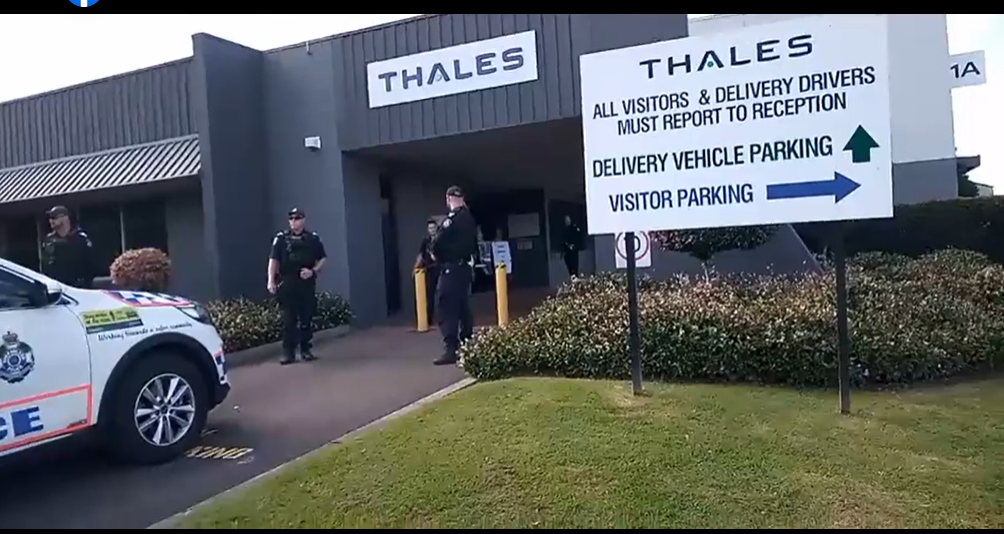
You and another activist were arrested over the peaceful demonstration outside of the Thales office. What happened from there? And how did the police treat you?
We went to the Thales office out at Pinkenba. That’s where they have a manufacturing base. We wanted to speak directly to management. They refused. So, we stayed and blockaded the door.
The police charged us with trespass and refusing to obey a police direction. My colleague David Johnson and I were arrested and taken for processing. We are due to appear in court on 6 July.
We were treated well by the police. But I did see other activists at Disrupt Land Forces who were not treated well. The police were extremely aggressive and violent towards them.
And lastly, Jason, while these weapons companies continue to supply stronger forces with arms to be used upon the less equipped populations they dominate, there’s also growing international talk around a coming war with China.
In light of this, what sort of developments need to take place in order to bring about substantial change?
That’s the big question. For us, Disrupt Land Forces was a bit of an experiment. It was a reflection on how a lot of what we have been doing is not working. So, it was exploring other ways.
We had an agreement around radical respect. We said we would not harm other living beings. And we would also work well together and respect one another’s actions and diversity.
We had room for Palestinians to lead a prayer vigil. We had Church leaders. And we also had a lot of people who were super angry. They were yelling at the people coming into the arms fair.
That was one of the ways we were experimenting with acting. But I will also say that we’ve just got to get more strategic and focused on who we are targeting and what kind of objectives we want.
We need to continually build disciplined and intersectional movements. We need to connect our different struggles.
At Disrupt Land Forces, we saw the connection between the climate movement and the antimilitary movement, as well as feminist struggles. We have to educate one another and recognise our common targets.
One example is Israeli arms company Elbit. It’s a company that’s been repressing Palestinians for decades.
They are also selling weapons to Indonesia, so this was an opportunity for Palestinians, West Papuans and solidarity activists from both those struggles to come together and support one another.
That’s also true for a number of the other companies as well.


